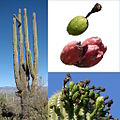Hygroscopy
Hygroscopy is the phenomenon of attracting and holding water molecules from the surrounding environment, which is usually at normal or room temperature. This is achieved through either absorption or adsorption with the absorbing or adsorbing substance becoming physically changed somewhat. This could be by an increase in volume, boiling point, viscosity or other physical characteristics or properties of the substance, as water molecules can become suspended between the substance's molecules in the process.
Overview[edit]
Zinc chloride and calcium chloride, as well as potassium hydroxide and sodium hydroxide (and many different salts), are so hygroscopic that they readily dissolve in the water they absorb: this property is called deliquescence. Not only is sulfuric acid hygroscopic in concentrated form but its solutions are hygroscopic down to concentrations of 10 Vol-% or below. A hygroscopic material will tend to become damp and cakey when exposed to moist air (such as the salt used in salt shakers during humid weather).
Applications[edit]
Because of their affinity for atmospheric moisture, hygroscopic materials might be used in various products to keep areas dry. They can be used in dessicant packs in leather products such as shoes and bags to prevent damaging effects from humidity.
Measurement[edit]
The amount of moisture held by hygroscopic materials is usually proportional to the relative humidity. Various materials and manufacturing processes rely on this property. For example, many industries must keep the relative humidity inside their plants at specific levels in order to maintain the quality of their products.
See also[edit]
-
Hygroscopy
-
Hygroscopy
-
Hygroscopy
-
Hygroscopy
-
Hygroscopy
-
Hygroscopy
-
Hygroscopy
-
Hygroscopy
-
Hygroscopy
-
Hygroscopy
-
Hygroscopy
-
Hygroscopy
Ad. Transform your life with W8MD's Budget GLP-1 injections from $49.99


W8MD offers a medical weight loss program to lose weight in Philadelphia. Our physician-supervised medical weight loss provides:
- Weight loss injections in NYC (generic and brand names):
- Zepbound / Mounjaro, Wegovy / Ozempic, Saxenda
- Most insurances accepted or discounted self-pay rates. We will obtain insurance prior authorizations if needed.
- Generic GLP1 weight loss injections from $49.99 for the starting dose of Semaglutide and $65.00 for Tirzepatide.
- Also offer prescription weight loss medications including Phentermine, Qsymia, Diethylpropion, Contrave etc.
NYC weight loss doctor appointmentsNYC weight loss doctor appointments
Start your NYC weight loss journey today at our NYC medical weight loss and Philadelphia medical weight loss clinics.
- Call 718-946-5500 to lose weight in NYC or for medical weight loss in Philadelphia 215-676-2334.
- Tags:NYC medical weight loss, Philadelphia lose weight Zepbound NYC, Budget GLP1 weight loss injections, Wegovy Philadelphia, Wegovy NYC, Philadelphia medical weight loss, Brookly weight loss and Wegovy NYC
|
WikiMD's Wellness Encyclopedia |
| Let Food Be Thy Medicine Medicine Thy Food - Hippocrates |
Medical Disclaimer: WikiMD is not a substitute for professional medical advice. The information on WikiMD is provided as an information resource only, may be incorrect, outdated or misleading, and is not to be used or relied on for any diagnostic or treatment purposes. Please consult your health care provider before making any healthcare decisions or for guidance about a specific medical condition. WikiMD expressly disclaims responsibility, and shall have no liability, for any damages, loss, injury, or liability whatsoever suffered as a result of your reliance on the information contained in this site. By visiting this site you agree to the foregoing terms and conditions, which may from time to time be changed or supplemented by WikiMD. If you do not agree to the foregoing terms and conditions, you should not enter or use this site. See full disclaimer.
Credits:Most images are courtesy of Wikimedia commons, and templates, categories Wikipedia, licensed under CC BY SA or similar.
Translate this page: - East Asian
中文,
日本,
한국어,
South Asian
हिन्दी,
தமிழ்,
తెలుగు,
Urdu,
ಕನ್ನಡ,
Southeast Asian
Indonesian,
Vietnamese,
Thai,
မြန်မာဘာသာ,
বাংলা
European
español,
Deutsch,
français,
Greek,
português do Brasil,
polski,
română,
русский,
Nederlands,
norsk,
svenska,
suomi,
Italian
Middle Eastern & African
عربى,
Turkish,
Persian,
Hebrew,
Afrikaans,
isiZulu,
Kiswahili,
Other
Bulgarian,
Hungarian,
Czech,
Swedish,
മലയാളം,
मराठी,
ਪੰਜਾਬੀ,
ગુજરાતી,
Portuguese,
Ukrainian









